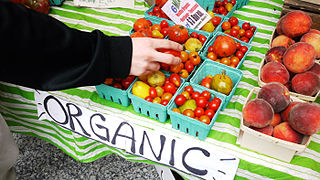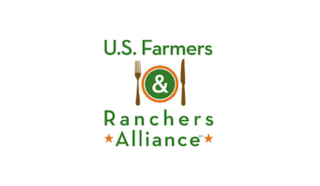
Fair trade is a term for an arrangement designed to help producers in developing countries achieve sustainable and equitable trade relationships. The fair trade movement combines the payment of higher prices to exporters with improved social and environmental standards. The movement focuses in particular on commodities, or products that are typically exported from developing countries to developed countries but is also used in domestic markets, most notably for handicrafts, coffee, cocoa, wine, sugar, fruit, flowers and gold.

Organic farming, also known as ecological farming or biological farming, is an agricultural system that uses fertilizers of organic origin such as compost manure, green manure, and bone meal and places emphasis on techniques such as crop rotation and companion planting. It originated early in the 20th century in reaction to rapidly changing farming practices. Certified organic agriculture accounts for 70 million hectares globally, with over half of that total in Australia. Organic farming continues to be developed by various organizations today. Biological pest control, mixed cropping, and the fostering of insect predators are encouraged. Organic standards are designed to allow the use of naturally-occurring substances while prohibiting or strictly limiting synthetic substances. For instance, naturally-occurring pesticides such as pyrethrin are permitted, while synthetic fertilizers and pesticides are generally prohibited. Synthetic substances that are allowed include, for example, copper sulfate, elemental sulfur, and ivermectin. Genetically modified organisms, nanomaterials, human sewage sludge, plant growth regulators, hormones, and antibiotic use in livestock husbandry are prohibited. Organic farming advocates claim advantages in sustainability, openness, self-sufficiency, autonomy and independence, health, food security, and food safety.

Community-supported agriculture or cropsharing is a system that connects producers and consumers within the food system closer by allowing the consumer to subscribe to the harvest of a certain farm or group of farms. It is an alternative socioeconomic model of agriculture and food distribution that allows the producer and consumer to share the risks of farming. The model is a subcategory of civic agriculture that has an overarching goal of strengthening a sense of community through local markets.

Organic lawn management or organic turf management or organic land care or organic landscaping is the practice of establishing and caring for an athletic turf field or garden lawn and landscape using organic horticulture, without the use of manufactured inputs such as synthetic pesticides or artificial fertilizers. It is a component of organic land care and organic sustainable landscaping which adapt the principles and methods of sustainable gardening and organic farming to the care of lawns and gardens.

The organic movement broadly refers to the organizations and individuals involved worldwide in the promotion of organic food and other organic products. It started during the first half of the 20th century, when modern large-scale agricultural practices began to appear.

Organic certification is a certification process for producers of organic food and other organic agricultural products, in the European Union more commonly known as ecological or biological products. In general, any business directly involved in food production can be certified, including seed suppliers, farmers, food processors, retailers and restaurants. A lesser known counterpart is certification for organic textiles that includes certification of textile products made from organically grown fibres.
Biodynamic agriculture is a form of alternative agriculture based on pseudo-scientific and esoteric concepts initially developed in 1924 by Rudolf Steiner (1861–1925). It was the first of the organic farming movements. It treats soil fertility, plant growth, and livestock care as ecologically interrelated tasks, emphasizing spiritual and mystical perspectives.
Agribusiness is the industry, enterprises, and the field of study of value chains in agriculture and in the bio-economy, in which case it is also called bio-business or bio-enterprise. The primary goal of agribusiness is to maximize profit while satisfying the needs of consumers for products related to natural resources such as biotechnology, farms, food, forestry, fisheries, fuel, and fiber.

Traditional farming was the original type of agriculture, and has been practiced for thousands of years. All traditional farming is now considered to be "organic farming" although at the time there were no known inorganic methods. For example, forest gardening, a fully organic food production system which dates from prehistoric times, is thought to be the world's oldest and most resilient agroecosystem. The industrial revolution introduced inorganic methods, most of which were not well developed and had serious side effects. An organic movement began in the 1940s as a reaction to agriculture's growing reliance on synthetic fertilizers and pesticides. The history of this modern revival of organic farming dates back to the first half of the 20th century at a time when there was a growing reliance on these new synthetic, non-organic methods.

Organic food, ecological food, or biological food are foods and drinks produced by methods complying with the standards of organic farming. Standards vary worldwide, but organic farming features practices that cycle resources, promote ecological balance, and conserve biodiversity. Organizations regulating organic products may restrict the use of certain pesticides and fertilizers in the farming methods used to produce such products. Organic foods are typically not processed using irradiation, industrial solvents, or synthetic food additives.

Proposition 2 was a California ballot proposition in that state's general election on November 4, 2008. It passed with 63% of the votes in favor and 37% against. Submitted to the Secretary of State as the Prevention of Farm Animal Cruelty Act, the initiative's name was amended to officially be known as the Standards for Confining Farm Animals initiative. The official title of the statute enacted by the proposition is the Prevention of Farm Animal Cruelty Act.
Animal-free agriculture, also known as veganic agriculture, stockfree farming or veganic farming, consists of farming methods that do not use animals or animal products.

Marin Organic is a non-profit 501(c)(3) association of organic producers headquartered in Point Reyes Station, California. Founded in 1999 with the goal of creating the first all-organic county, Marin Organic is known for working with the government, community groups and organizations, fellow ranchers and farmers to advance the practice of sustainable, organic production. The organization is internationally recognized model for building economically viable, community-based local foodsheds.

Brad Stewart Lancaster is an expert in the field of rainwater harvesting and water management, sun & shade harvesting and community-stewarded native food forestry. He is also a permaculture teacher, designer, consultant, live storyteller and co-founder of the Dunbar/Spring Neighborhood Foresters, and Desert Harvesters,both non-profit organizations.
Organic aquaculture is a holistic method for farming fish and other marine species in line with organic principles. The ideals of this practice established sustainable marine environments with consideration for naturally occurring ecosystems, use of pesticides, and the treatment of aquatic life. Managing aquaculture organically has become more popular since consumers are concerned about the harmful impacts of aquaculture on themselves and the environment.
Florida Certified Organic Growers and Consumers, also known as Florida Organic Growers or FOG, is a non-profit organization founded in 1987. It is classified as a 501(c) corporation. One of the main facets of FOG is Quality Certification Services, a program that extends through 30 states and 14 countries. FOG is also concerned with community outreach and education in order to promote healthy organic lifestyles and social equity.

The U.S. Farmers and Ranchers Alliance is an alliance of agriculture related interest groups and organizations that promote industrial agriculture in the United States. Their aim is to promote a positive image of modern agricultural practices. They are supported by checkoff funds from the United States Department of Agriculture and by cooperate donations. The alliance has been criticized for a bias towards corporate agricultural practices.
Jim Gerritsen is an American farmer and activist from Maine. He is mostly known for his involvements in the politics of Organic Faming as the proponent of the same. Gerritsen is President of the Maine-based national trade organization Organic Seed Growers and Trade Association (OSGATA).

The Maine Organic Farmers and Gardeners Association (MOFGA) certifies organic food and products throughout the State of Maine. It is a voluntary organization whose office is located in Unity, Maine. As of 2016, MOFGA certifies 480 producers and growers.

Karen Washington is a political activist and community organizer fighting for food justice.













